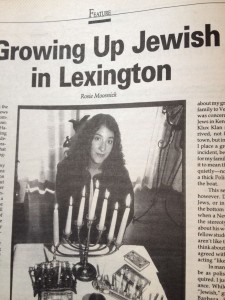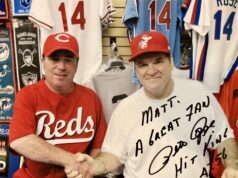Ace December 1994
BY ROSIE MOOSNICK
Every year at about this time, with the onset of the Christmas season, the news media makes overtures to the Jewish community, presenting images of Jewish families celebrating the festival of lights, Hanukkah. The Je

ws, so it seems, are coping well with the dominance of Christmas, despite the fact that it dwarfs their celebration. But are appearances reality? Just what is it like to grow up a minority in Lexington, Kentucky?
With the recent shooting of Tony Sullivan, the existence and the conditions of life of African Americans in Lexington have been thrust into the public eye. But Lexington, of course, is home to many other small populations of minorities: Palestinians, Chinese, and Indians, just to name a few. If the shooting signals anything to the residents of Lexington, it says that it is well past time that we addressed the needs of minorities and understood that some among us experience Lexington differently from what is possibly considered the cultural norm.
One can only hope that the city is today sufficiently mature to try understanding the experiences of minorities. Knowledge of others’ perspectives begins this maturation process. I know that, by revealing my experiences as a Jew, I can contribute to Lexington’s self-knowledge and growth.
Santa Claus was probably the first Christian symbol to penetrate my psyche and tell me I stood outside the cultural norm. From an early age, I knew all about Santa. I understood that he was the embodiment of good and that if you crossed this old man, you wouldn’t profit. So, from the beginning, I tried to understand why Santa didn’t stop at my house on Christmas Eve. “Was I bad? Undeserving of toys?” I wondered. “We are Jewish. We don’t believe in Santa,” I was told.
But Santa was everywhere, how could I not believe? Steadfast in my belief, I pondered logistical considerations. If Santa was flying around up there, how did he know not to stop at our house? Dazzled by the holiday spirit, I supposed that Santa and his reindeer knew to leep past our house because bright Christmas lights appeared miraculously on our rooftop on Christmas Eve, spelling in gigantic letters, “JEWS.”
Later, when I was certain Santa was a fabrication, I felt superior to my Christian friends, because long before they had a clue, I knew there wasn’t a Santa. Thus I managed to cope with Santa Claus. As I grew older, however, I found other aspects of Christmas just plain isolating. The Christmas gaiety at the malls, the music and decorations; all this didn’t speak to me.
And even as it seemed that my family was increasingly incorporating this gaiety (in particular the multitude of lights and even silver foil) into our Hanukkah celebration, this assimilation didn’t alleviate the dread I experienced on Christmas Day. The big day meant I was quarantined in the house. It meant that nothing was open, not even the malls, and that there was no one to talk to since my Christian friends were busy. My family, of course, found ways to adjust, like fleeing to Chinese restaurants with other non Christians.
Christmas wasn’t the only time of year that religious differences caught my attention. I routinely missed school for the Jewish High Holidays, and while I enjoyed the reprieve this brought, I dreaded the attention poured on me upon my return. I sometimes felt as if I were a Jewish poster child: “Describe your holidays to the class,” the teacher would good-naturedly intone.
Others, however, were not so well intentioned. I was perhaps only eight or nine when some neighborhood kids sang in unison to me, “You killed Jesus, you killed Jesus.” Horrified, I ran home crying and asked my mother about this accusation. I can still see her lighting her cigarette, pained by my story, and what’s more, scared. These children didn’t have the social grace to hold back things that their parents or preachers thought but never articulated.
Such incidents raised a litany of questions for my family. Didn’t Jews hear similar accusations in another land and time? The question always arose: Could a holocaust happen here? Unlike European Jews, we would be prepared. By the age of ten, for instance, I had already combed our house for a hiding place. Better than Anne Frank, I would find a foolproof place for concealment. My brother, on the other hand, developed a Jewish Rambo attitude to the whole thing. “I’ll give them a good fight, if they try to take me,” he declared. But while we had our plan, our lives were comfortable, so we really thought little about this.
Yet this comfort was sometimes diminished. Virtually the only tale I know about my grandfather is that he brought his family to Versailles in 1924, even though he was concerned about the comfort level for Jews in Kentucky. Rumor has it that the Ku Klux Klan rallied the night before he arrived, not because a Jew was coming to town, but in one of their routine gatherings. I place a great deal of significance on this incident, because I think it was meaningful for my family. My grandparents interpreted it to mean that it would be best to be Jewish quietly — not easy for my grandfather with a thick Polish accent who was not long off the boat.
This self-protective attitude lingered, however. Don’t act like those New York Jews, or in any way “stereotypical,” was the bottom line. I remember in high school when a New York Jew, who confirmed all the stereotypes, came to my class to talk about his work. After he spoke, a friend and fellow student remarked, “What a Jew! You aren’t like that guy, Rosie.” I cringe when I think about this incident, because I proudly agreed with him. I had managed to avoid acting “like a Jew.”
In many ways, however, I just couldn’t be as polished as the Southern ideal required. I just didn’t have the right appearance. While not all Jews, of course, look “Jewish,” growing up I often felt like I wore Barbara Streisand’s nose and Art Garfunkel’s hair. I have a nose a little bigger and hair a little kinkier than is standard in Lexington. While these features today are sources of pride for me, I once found them to be hindrances. I recall one junior high school boy’s evaluation: “She would be pretty, if she didn’t have such a big nose.”
And how can I forget one youth in particular from high school who interacted with me only by riding me about my nose? I dreaded encountering him, for it meant more “kidding.” He would try to measure my nose with his finger and thought this was funny. He probably doesn’t remember now, but I can still see the routine he put on for the most popular older kids whom we were both trying to impress.
Somehow this boy’s banter made me feel like Woody Allen in Annie Hall, for while this kid was measuring my nose, I was suddenly transformed from a secular Jew into a religious one, so obviously marked by my attire. And this didn’t happen in the secure environs of Brooklyn. I was alone, surrounded by the most goyish of the goyem. (Yiddish for non Jew.)
Although experiences like these are searing for children and adolescents, as an adult, I realize that things really weren’t so bad. Like so many liberal Jews, I believe that I haven’t really suffered as have African Americans, for instance. In many ways, I have had it good in Lexington. But reflecting upon my own experiences leads me to wonder about and fear the adversity I would have faced in Lexington had my class status not been so secure and my skin not so white. Perhaps belonging to a minority affords one insight not available to the majority.
In any event, the holiday season is a propitious time to attempt to understand the positions of others who do not celebrate Christmas, or who have little means to enjoy the material goods that symbolize the holiday.







